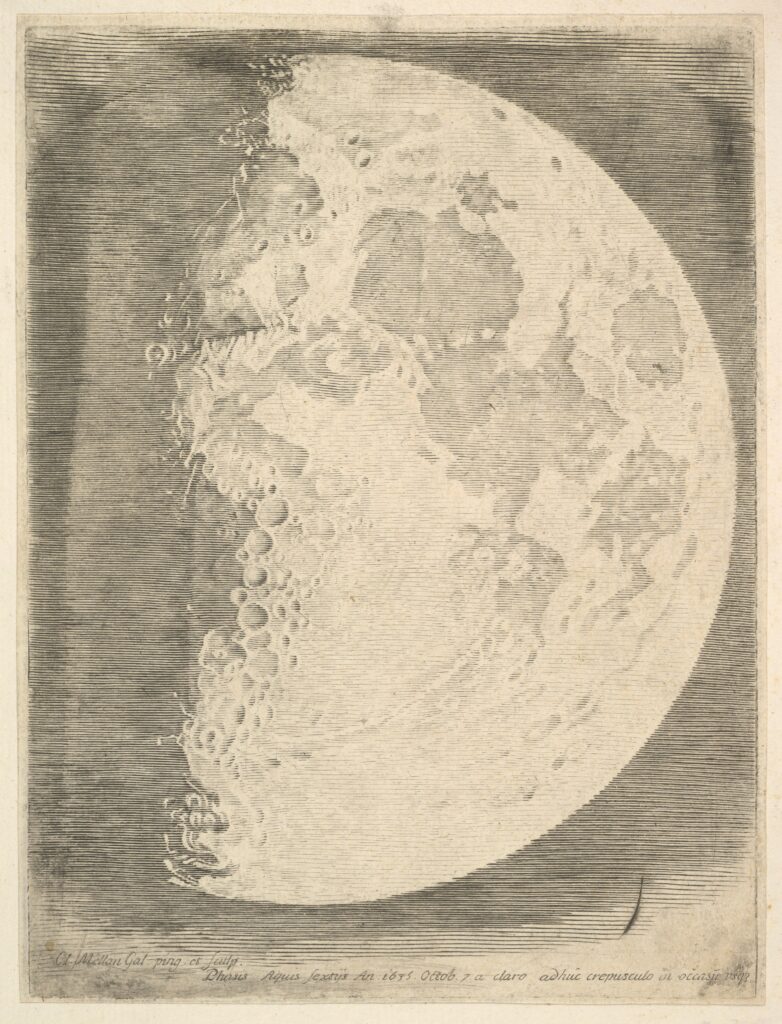
Claude Mellan (French, Abbeville 1598–1688 Paris), The Moon in Its First Quarter, 1635. The Metropolitan Museum of Art, New York. From the Elisha Whittelsey Collection, courtesy of the the Elisha Whittelsey Fund.
I. The World Worlds
It’s probably not the most promising beginning to this talk for me to observe that my subject, like silence, has a way of disappearing the moment you speak of it. Love, anger, regret, even boredom—wonder’s antipodes—may entrench themselves in us more deeply over time, but wonder, I’d venture, is always already a fugitive affair. Maybe it’s a matter of developmental psychology; in the middle of life, I find myself becoming a nostalgist of childhood wonder. (These days I feel it mostly in my dreams.) Or maybe it’s civilization itself that’s outgrown its wonder years. We start out with the marvels of the ancient world—the Great Pyramid of Giza, the Hanging Gardens of Babylon, the Colossus of Rhodes—only to arrive, in our disenchanted era, at Wonder Bread. Any way you slice it, wonder is ever vanishing. Still, I suspect the occasional sighting of this endangered affect has something to do with why someone like me continues to write poems in the twilight of the Anthropocene. Of course, William Wordsworth said all this more eloquently and in pentameter verse, too. Maybe poetry is a faint trace of wonder in linguistic form. By following that trace for the next hour or so, I hope we’ll come a bit closer to wonder itself.
Let’s begin with an early wonder of the Western literary tradition. In Book 18 of the Iliad, the god Hephaestus forges a shield for Achilles, who’s lost his armor in the bloody fog of war. But as Hephaestus works the shield’s surface, this peculiar blacksmith—being a god, after all—simply can’t resist creating a world, too:
There he made the earth and there the sky and the sea
and the inexhaustible blazing sun and the moon rounding full
and there the constellations, all that crown the heavens
A little creation myth blossoms amid the slaughter, as Hephaestus hammers not only Earth but—within the brief passage of three dactylic hexameters—the totality of the known cosmos onto the shield as well. And he’s only just getting warmed up, really. Over the next 150 lines of the poem, Hephaestus emblazons the shield’s surface with a compact survey of ancient civilization, including the arts of war, law, agriculture, animal husbandry, astronomy, music, dance, and so on. A sensualist at heart, he sets this panorama buzzing all over with Epicurean minutiae: we see “bunches of lustrous grapes in gold, ripening deep purple”; we hear a boy plucking his lyre, “so clear it could break the heart with longing”; we even taste the savor of “a cup of honeyed, mellow wine.” Not bad for a piece of antiquated military equipment. Faced with such artistry, I can’t help thinking of the shield’s disabled maker as a kind of poet, like the blind Homer himself. Sure enough, Hephaestus incorporates a miniature epic into the shield’s pageantry, too, with its own besieged city, fraught war councils, interfering gods, and loved ones watching anxiously from the ramparts as a tiny surrogate Hector is hauled “through the slaughter by the heels.” No wonder Homer describes the shield as “a world of gorgeous immortal work.” It contains an entire Iliad and more within its gilt compass.
Beguiled by Homer’s art, some readers have even tried to reverse engineer real shields from this literary blueprint over the millennia. Probably the most spectacular example of all time was fabricated for display at George IV’s coronation banquet by the sculptor, draftsman, and Homer enthusiast John Flaxman in 1821. It’s a marvel of nineteenth-century British punctiliousness in low relief.
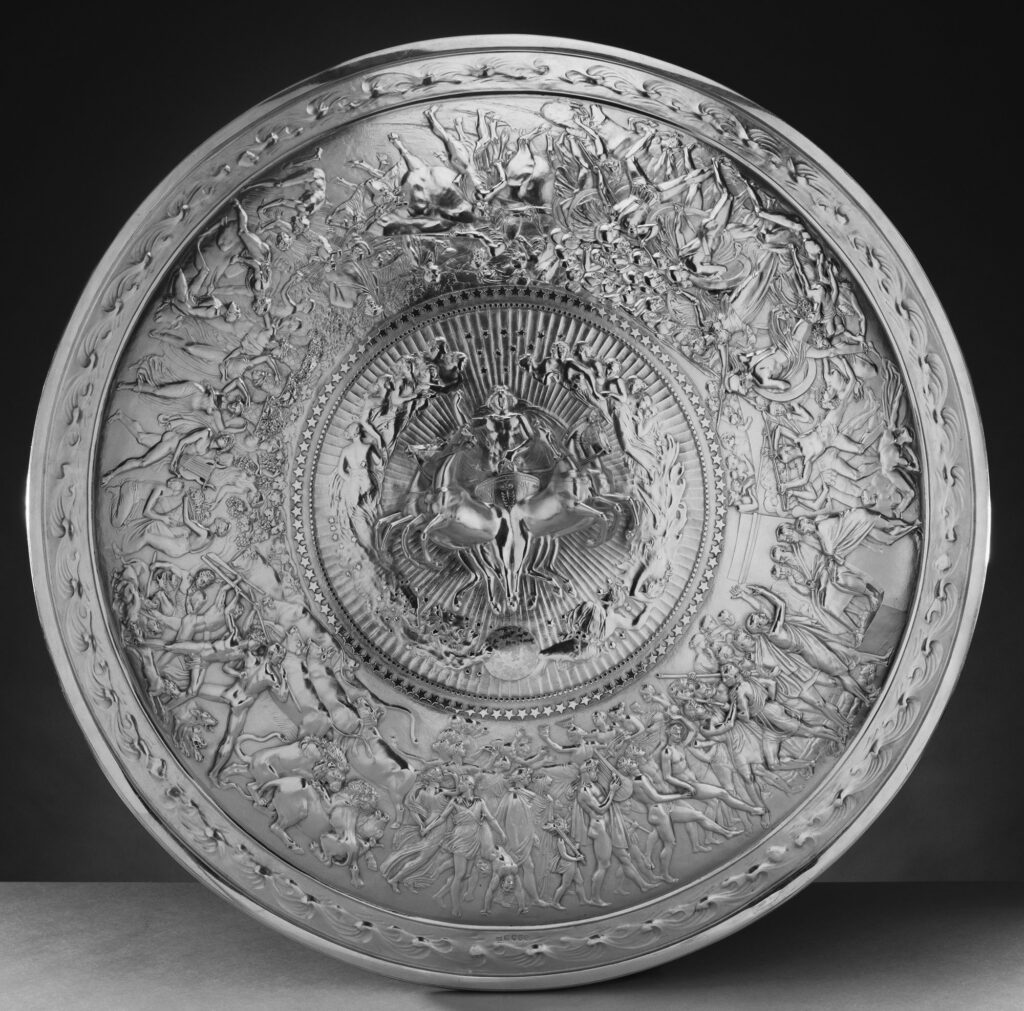
The Shield of Achilles designed by John Flaxman and cast by Rundell & Bridge.
Here we find bunches of lustrous grapes in gold, a boy with his lyre, and that cup of honeyed wine—all meticulously accounted for. And yet I can’t help feeling this luminous artifact offers, at best, only a low-resolution copy of the Homeric original. Let’s zoom in for a moment on those golden hounds at their masters’ feet to have a closer look.
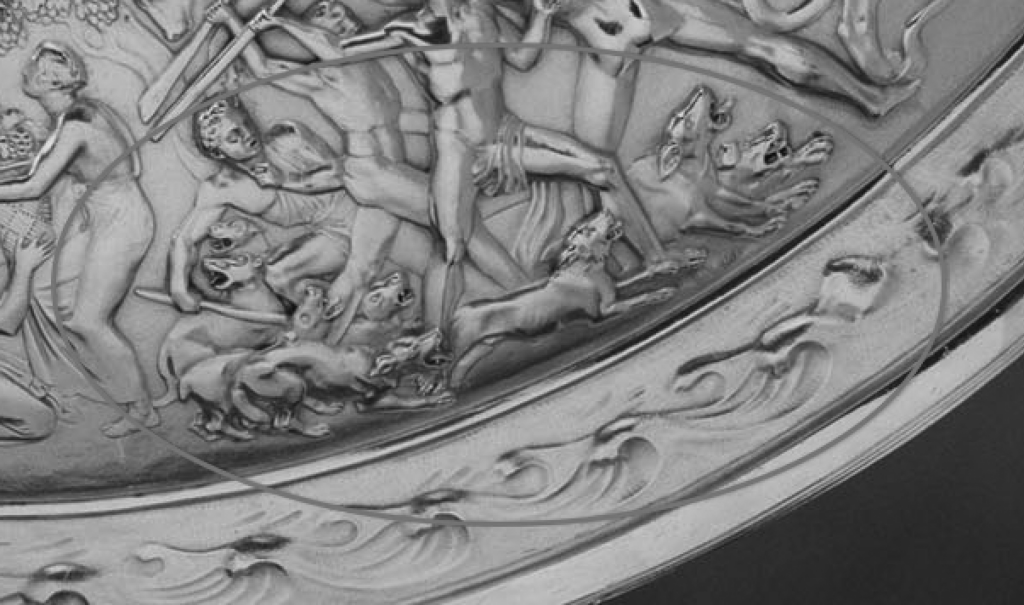
I’m not sure why Homer enumerates the figures in this little tableau with such exactitude amid all the shield’s armies, crowds, and processions—“and the golden drovers kept the herd in line, / four in all, with nine dogs at their heels”—but it offers us a perfect opportunity to check Flaxman’s work for quality control. Four drovers? Check. Now let’s count the dogs. (You might think I’m being persnickety here, and with good reason, but bear with me just a little longer.) So where is that ninth hound? Marianne Moore once famously claimed that “omissions are not accidents.” It’s hard to say whether Flaxman’s missing hound is an omission or an accident, but it makes me wonder.
Listen carefully, and you’ll hear the poor beast—“barking, cringing away”—somewhere in the vaporous limbo between fiction and reality. “Paws flickering,” it’s a creaturely cipher for what’s lost when we translate the virtual into the real. The former U.S. Army cryptographer and Homer enthusiast Cy Twombly illustrates this loss in oil, crayon, and graphite in his postmodern Shield of Achilles a century and a half later.
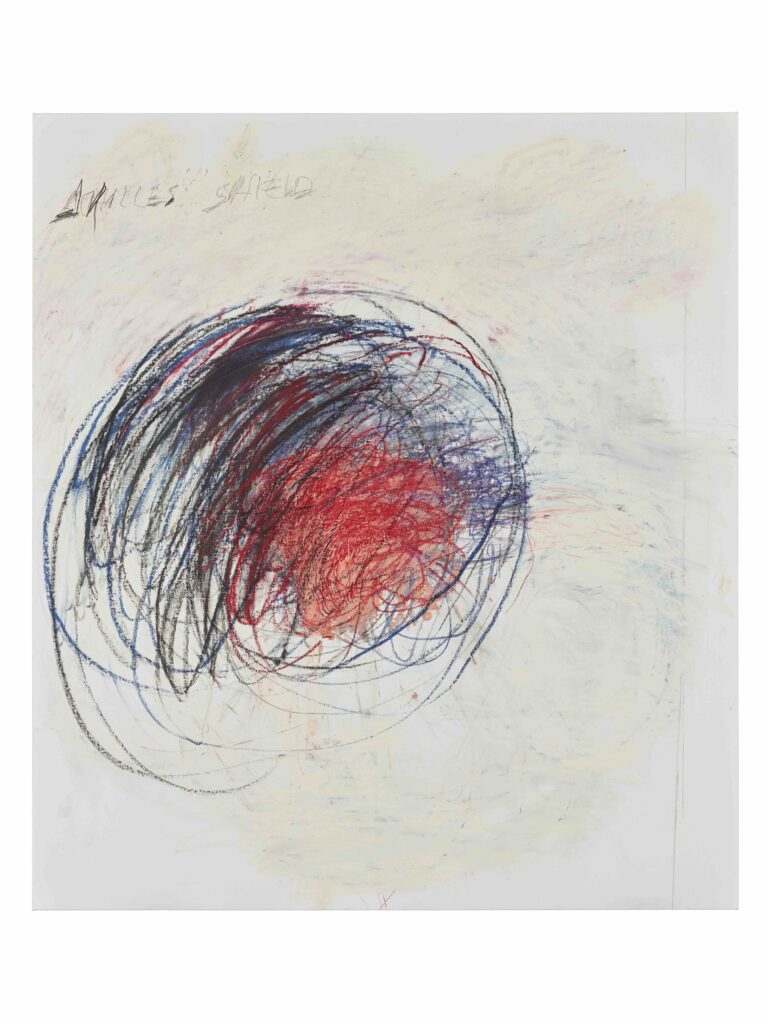
Shield of Achilles by Cy Twombly, courtesy of the Philadelphia Museum of Art: Gift (by exchange) of Samuel S. White 3rd and Vera White, 1989, 1989–90–1. Courtesy of the Cy Twombly Foundation.
You won’t find our missing hound here, either—and that’s the whole point of Twombly’s abstraction. All those kinetic scribbles convey Homer’s energeia, or literary energy, but they also make an absolute hash of the shield’s pictorial imagery. Not even a cryptographer can code so much world into so small a space. Whether you reconstruct it like Flaxman or deconstruct it like Twombly, the shield of Achilles will forever remain an impossible object. It belongs to that wondrous category of things that are larger inside than outside, like a poem, or a person, or a world. “The world is not the mere collection of the countable or uncountable, familiar and unfamiliar things that are at hand,” writes Martin Heidegger in The Origin of the Work of Art, “but neither is it a merely imagined framework added by our representation to the sum of such given things. The world worlds.” Homer’s shield isn’t a picture of all the countable or uncountable things—star systems, ripening grape clusters, flickering hounds—that populate the world. As Flaxman and Twombly discovered, it can’t even be pictured at all. But it worlds.
“Glorious armor shall be his, armor / that any man in the world of men will marvel at / through all the years to come,” Hephaestus predicts as he hammers the glowing cosmos on his forge. If you were to survey the readers’ responses to this literary marvel over the millennia—from the anonymous commentators of antiquity to moderns like Alexander Pope and G. E. Lessing to undergraduate term papers in Humanities 101—you’d end up with something like a brief history of wonder in Western civilization. Describing the plowmen at work on the shield’s figured surface, Homer himself is the first among mortals to express wonder at its construction:
And the earth churned black behind them, like earth churning,
solid gold as it was—that was the wonder of Hephaestus’ work.
I can’t imagine a more gorgeous description of humanity’s passage through the dark field of world: “the earth churned black behind them, like earth churning.” But why doesn’t Homer say the shield’s golden surface churned like earth churning? This Möbius strip of a simile is a marvel in its own right. Spellbound by Hephaestus’s artistry, we forget the shield’s a shield in the first place—so we feel we’re watching soil behave “like” itself. It’s a kind of reverse alchemy, where gold becomes dirt, vehicle becomes tenor, and shield becomes world. Sometimes it seems there’s no escaping wonder before such worlding work. Of the golden women depicted in the shield’s wedding procession, Homer writes, “Each stood moved with wonder.” I’m not sure whether we should envy or pity these embossed figures, forever frozen in transport at the wonder they inhabit.
But there’s a serious glitch in the god’s plans for this “world of gorgeous immortal work.” Though Hephaestus prophesies that “any man in the world of men will marvel” at his craft, none of the many men in the Iliad—Trojan or Greek—ever marvel at the shield’s construction. Achilles’s fellow soldiers won’t even look at the god’s radiant work: “none dared / to look straight at the glare, each fighter shrank away.” Only a blind genius could invent such tragic optics. Homer embeds a gilded cosmos in the midst of the epic for his readers to marvel at through the ages, but the Iliad’s inhabitants remain forever blind to this wonder hidden in plain view. Beholding his gift from the gods, even Achilles—the only mortal who scrutinizes the shield’s figured surface—fails to wonder at the sight:
The more he gazed, the deeper his anger went,
his eyes flashing under his eyelids, fierce as fire—
exulting, holding the god’s shining gifts in his hands.
Rage (mēnis) is the first word of the Iliad, and we usually associate it with blindness rather than perception: “I was blinded, lost in my inhuman rage,” says Agamemnon during one of his many changes of heart in the poem. But Homer envisions something like a phenomenology of rage in this scene: “The more he gazed, the deeper his anger went.” For Achilles, anger is more than affect—it’s an adjunct of perception itself. Only once he’s “thrilled his heart with looking hard / at the armor’s well-wrought beauty” does he break off his furious gaze. Instead of blinding him, rage furnishes this exceptional character with a singular perspective on things.
Why does Achilles alone rage at this “world of gorgeous immortal work”? It may have something to do with his sense of vocation. In Book 9 of the Iliad, we find him in his tent, “plucking strong and clear on the fine lyre” he won in battle long ago, “singing the famous deeds of fighting heroes.” I can’t help feeling this armchair bard would have made a passable poet in a different world. (Isn’t every poet a sulky egotist with a hyperactive death drive, after all?) But Achilles is born to fight, not to sing. Anything that comes between him and his bloody vocation—including the “beautifully carved” lyre, “its silver bridge set firm”—must be cast aside for him to follow this calling. Not even life itself matters more to him than this grim occupation. “Hard on the heels of Hector’s death your death / must come at once,” his mother warns him, but Achilles only retorts, “Then let me die at once.” What’s the point of living if you can no longer kill? Achilles doesn’t work to live, he lives to work—Homer uses the word ergon, which means something like “labor,” to describe the hero’s exertions on the battlefield—and his business is death.
Wonder, for the Greeks, led to a very different sort of vocation. We see this illustrated in a scene from Plato’s Theaetetus, where Socrates plays his customary role of career counselor to a youth he’s interrogated to the point of utter perplexity:
Theaetetus: By the gods, Socrates, I am lost in wonder when I think of all these things, and sometimes when I regard them it really makes my head swim.
Socrates: It seems that Theodorus was not far from the truth when he guessed what kind of person you are. For this is an experience which is characteristic of a philosopher, this wondering [thaumazein]: this is where philosophy begins and nowhere else.
Funny how Theaetetus must first become “lost in wonder” in order to find himself. He learns “what kind of person” he is—a philosopher—from his brush with thaumazein. This beats any aptitude test I took in high school. For Plato, wonder “is where philosophy begins and nowhere else.” No wonder, no philosophers. Even Aristotle, who built a whole philosophical system from his lover’s quarrel with Plato, agrees on this point. “It is through wonder that men now begin and originally began to philosophize,” he observes in the Metaphysics, “wondering in the first place at obvious perplexities, and then by gradual progression raising questions about the greater matters too, e.g. about the changes of the moon and of the sun, about the stars and about the origin of the universe.” If this sounds familiar, it’s because we’ve come full circle, to the origin of the cosmos—the earth, the stars, “the inexhaustible blazing sun and the moon rounding full”—that Hephaestus hammered onto the shield’s bright circumference in the first place. But we’ve yet to consider those “greater matters” that form the astronomical rungs on the ladder of Aristotle’s ascent into thaumazein—the moon, the sun, the stars, and the origin of the universe. Let’s take the next step in wonder’s philosophical progression and look to the moon.
II. Worlds Beyond
Sooner or later, the moon pops up on pretty much every poet’s literary horizon. Whether you’re a Japanese courtesan, a Yoruban folk singer, or a Conceptualist cosmonaut, it’s as close as the art comes to a timeless universal motif. But how many poets ever make the moon feel new in their art? Nearly 350 years ago, John Milton managed to work a nifty little lunar renovation into the epic paraphernalia of Paradise Lost, as the irrepressible Satan—after nine days and nights in free fall from the battlefield of heaven—takes up arms once again:
His ponderous shield,
Ethereal temper, massy, large and round,
Behind him cast. The broad circumference
Hung on his shoulders like the moon whose orb
Through optic glass the Tuscan artist views
At evening from the top of Fesolè,
Or in Valdarno to descry new lands,
Rivers or mountains in her spotty globe.
Even the most pious poet can’t resist a bit of literary vandalism now and then. Emblazoning the full moon on Satan’s shield, Milton blots out the classical world of Achilles’s shield—just as Paradise Lost will, he hopes, eclipse the Iliad in the annals of literary history someday. “Massy” yet also “ethereal [in] temper,” Satan’s shield is another kind of impossible object, or hyperobject. It belongs to that wondrous category of things that hold dual citizenship in the realms of the material and the ideal, like a poem, or an angel, or the venerable moon itself. Since antiquity, astronomers had speculated about the moon’s ontology—was it composed of ethereal vapors, or massy like the earth?—until Milton’s “Tuscan artist” put these theories to the proof with the aid of his “optic glass.” Oddly, we don’t really see much of the moon on Satan’s shield. Superimposed on its “spotty globe,” we find a portrait of Galileo Galilei—the man in Milton’s moon—who, more than any poet or rebel angel, revolutionized our view of the heavens above.
Milton visited Galileo—by then old, blind, and under house arrest—in Florence during the summer of 1638. (DreamWorks has been sitting on my script of this story for ages.) In his book The Starry Messenger, Galileo had published the first topographical drawings of the moon’s surface to appear in the West nearly three decades earlier.
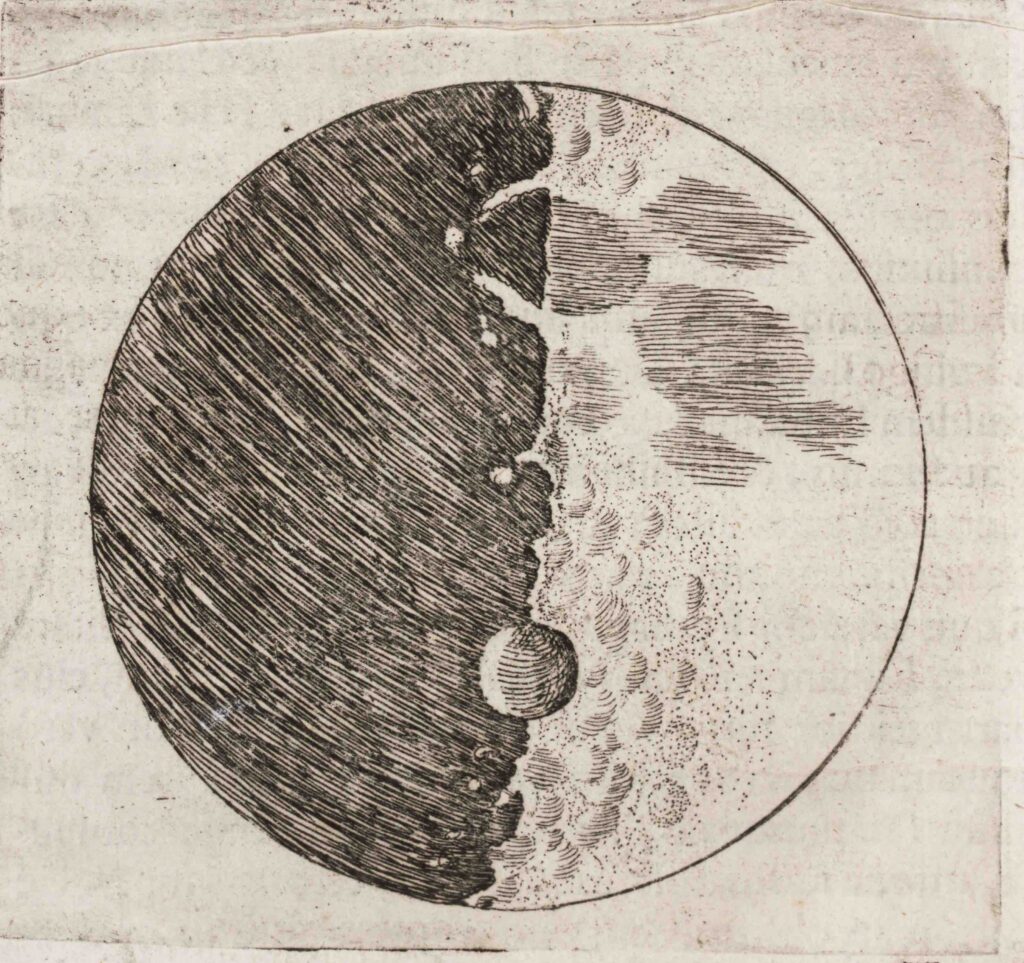
Galileo’s moon sketch. Courtesy of Linda Hall Library of Science, Engineering & Technology.
Peering through his telescope, the Florentine astronomer marveled at a cratered and mountainous terrain that defied expectation:
The surface of the Moon is not even, smooth and perfectly spherical, as the majority of philosophers have conjectured that it and the other celestial bodies are but, on the contrary, rough and uneven, and covered with cavities and protuberances just like the face of the Earth, which is rendered diverse by lofty mountains and deep valleys.
Galileo discovered that the moon, too, was a world, “just like” ours. Look closely at that progression of topological nouns ending Milton’s lines, and you’ll see how the moon came of age as a world in this period—from a flat “circumference” to a volumetric “orb” to a mapmaker’s “globe.” In Galileo’s wake, the French engraver Claude Mellan’s moon maps would soon highlight the chiaroscuro curvature of the lunar orb.
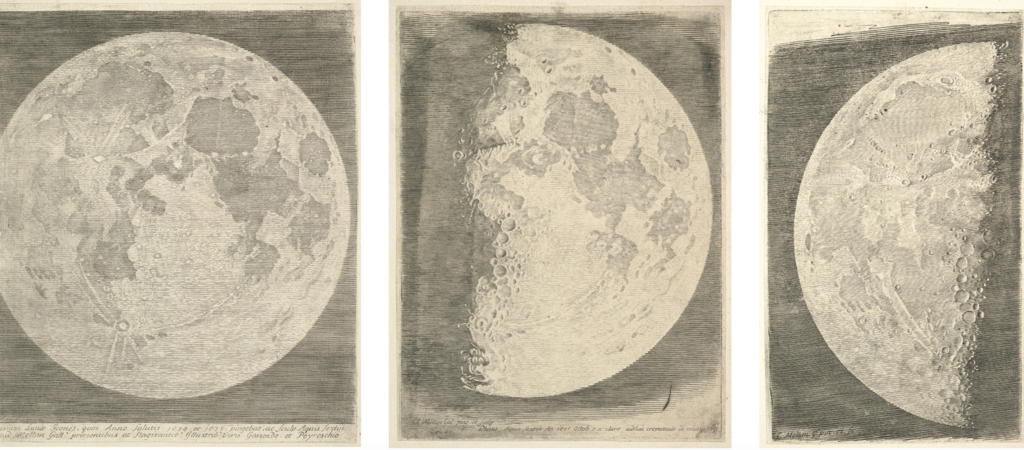
Three representations of the moon by Claude Mellan, courtesy of The Elisha Whittelsey Collection, The Elisha Whittelsey Fund, 1960.
By the end of the eighteenth century, the moon had assumed world-like dimensions in the British artist John Russell’s aureate globe.
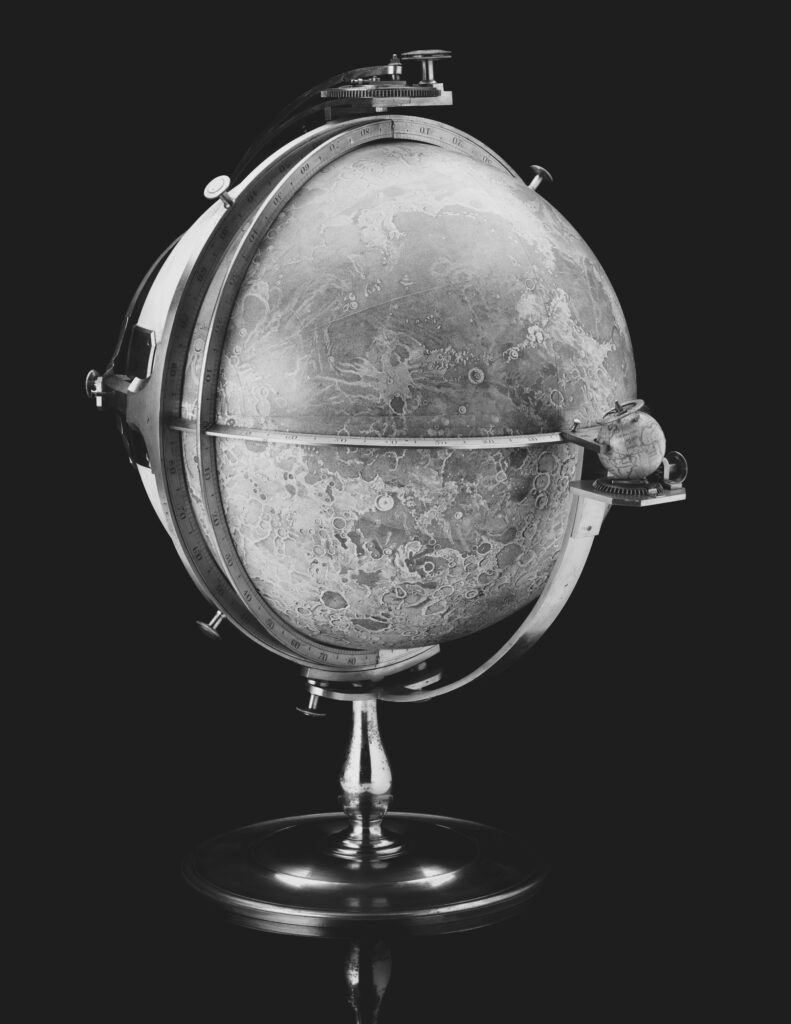
Moon globe by John Russell.
All this time, Earth was yielding its last blank spots—known as sleeping beauties—to the epistemological imperium of geography. But now another “spotty globe” offered “new lands, / Rivers or mountains” to be mapped—and the moon was only the beginning.
The moon on Satan’s shield heralds a revolution in the history of cosmological wonder. Galileo’s telescope revealed a host of worlds in the heavens above—new moons circling Jupiter, stars never before seen by the human eye—all swiftly incorporated into blind Milton’s literary vision of the cosmos. Paradise Lost stages a universal masque of wonder beneath this canopy of plural worlds. Awestruck, Adam delivers a Hamletic soliloquy on outer space, which makes of “this earth a spot, a grain, / An atom with the firmament compared / And all her numbered stars that seem to roll / Spaces incomprehensible.” Milton himself wonders if God might “ordain / His dark materials to create more worlds” from chaos someday. Satan, too, plays the amateur cosmologist, speculating that “space may produce new worlds” for his legions to invade following their expulsion from the kingdom of heaven. If you find Paradise Lost slow going, try reading it as science fiction. (Spielberg, what are you waiting for?) Nebulous monsters wing their way through star systems. Angels and demons alike imagine humans colonizing other planets. For the first time in English poetry, we view Earth from outer space—“that globe whose hither side / With light from hence though but reflected shines”—half cloaked in brightness, half in shadow. I could go on. But amid all this, the archangel Raphael warns Adam—and, consequently, Star Trek aficionados everywhere—to “dream not of other worlds, what creatures there / Live in what state, condition or degree.” Maybe wonder, like the moon, has a dark side.
Let’s not forget that the most wonderstruck character in Paradise Lost also happens to be the most fiendish by far. Unlike furious Achilles, Satan simply can’t stop mooning over all of creation. From the stairway to heaven, he “looks down with wonder” at Earth below; once he’s touched down on our planet, he gazes upon Eden “with new wonder”; when he first sees Adam and Eve, he’s overcome by “wonder and could love” them, too. Such vulnerability to wonder, on Satan’s part, is frankly endearing. I, for one, can’t help feeling sympathy for the poor devil when we last see him—at the conclusion of his final speech to the rebel angels in hell—still wondering to the bitter end:
He stood expecting
Their universal shout and high applause
To fill his ear when cóntrary he hears
On all sides from innumerable tongues
A dismal universal hiss, the sound
Of public scorn. He wondered but not long
Had leisure, wond’ring at himself now more:
His visage drawn he felt to sharp and spare,
His arms clung to his ribs, his legs entwining
Each other till supplanted down he fell
A monstrous serpent on his belly prone
I’ve felt this way after poetry readings myself sometimes. (Isn’t every poet a narcissistic angel in reptilian form, after all?) Satan’s ultimate object of wonder in Paradise Lost isn’t a newly discovered planet, or humankind, but “himself,” transformed into a serpent. You’d expect Satan to feel horror at this grotesque Ovidian metamorphosis—his cranium warping hideously, his arms fusing into his torso, his legs corkscrewing into a scaly tail—but this antihero’s wondrous journey through the cosmos ends where it began, in a failure to see himself for what he really is. Maybe dreaming too much of worlds beyond reach can make a monster of you.
Worlds swim through Paradise Lost like bubbles in a glass of champagne, but Milton cautions us not to lose sight of ourselves in this teeming universe. Who’s more blind to our world than the astronomer squinting into his telescope’s eyepiece? “They can foresee a future eclipse of the sun,” writes Augustine in his Confessions, “but [they] do not perceive their own eclipse in the present.” I suspect Milton had this sort of inner eclipse in mind when he described Satan’s dusky radiance following the archangel’s fall from heaven:
His form had not yet lost
All her original brightness nor appeared
Less than archangel ruined and th’ excess
Of glory obscured, as when the sun, new ris’n,
Looks through the horizontal misty air
Shorn of his beams or from behind the moon
In dim eclipse disastrous twilight sheds
On half the nations and with fear of change
Perplexes monarchs. Darkened so, yet shone
Above them all th’ archangel
Milton’s selenographic shield may advertise Galileo’s discoveries, but its spotty globe also reminds us that Lucifer—the erstwhile “bringer of light”—is, in truth, eclipse personified: “Darkened so, yet shone / Above them all th’ archangel.” Nothing discloses the dark side of wonder like an eclipse. I once saw one, through a piece of welder’s glass, in a derelict park on the other side of the world. Even the crows seemed perplexed by its disastrous twilight. There was an uncanny chill, as if a refrigerator door had swung open inside me. But the wonder of it all wasn’t that the sun had been blotted out overhead. What stopped my breath was the slow silhouette of another world gliding into view.
III. Worlds Within
Three centuries after Paradise Lost first lit up the Western literary firmament, an American poet, cookbook author, and marijuana enthusiast named Ronald Johnson purchased an 1892 edition of Milton’s poem in a Seattle bookshop—and promptly began to black out most of the text from its pages.
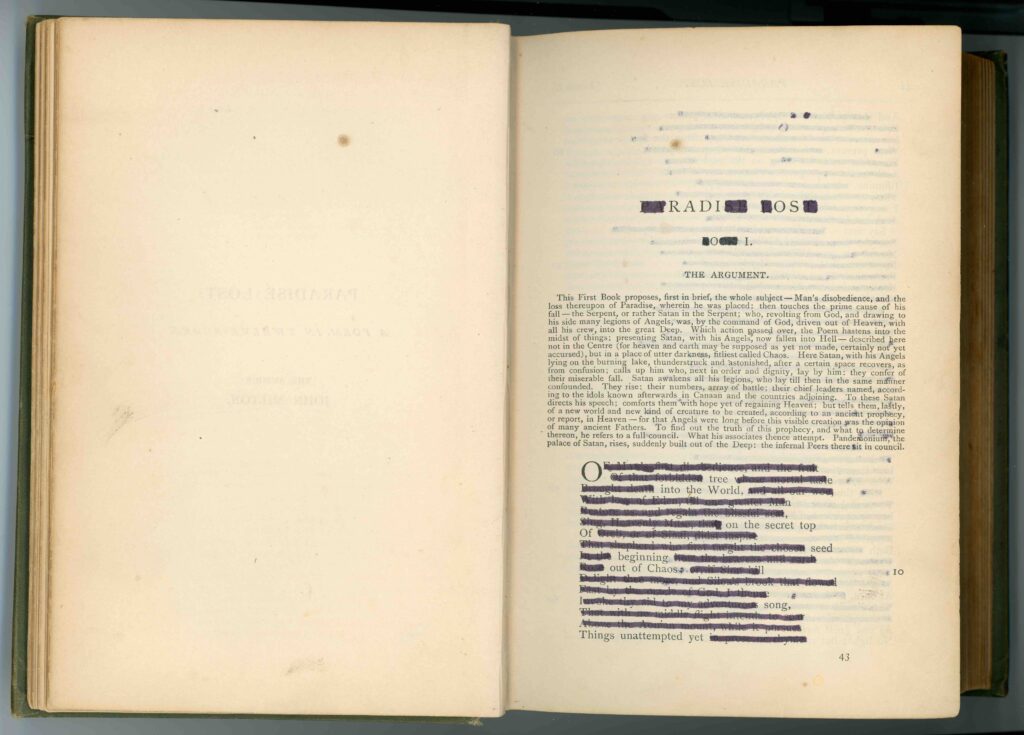
Image courtesy of the Ronald Johnson Collection, Kenneth Spencer Research Library, University of Kansas. Used with permission of the Literary Estate of Ronald Johnson.
Why would anyone so meticulously deface an already outdated copy of the venerable Puritan epic? “I got about halfway through it, kind of as a joke,” Johnson later explained in an interview, like a sheepish delinquent caught spray-painting a cathedral. “But I decided you don’t tamper with Milton to be funny. You have to be serious.” What began as a little joke at Milton’s expense developed into a postmodernist masterpiece of literary eclipse in its own right. Blot out the first and last two letters of paradise, and you have radi. Lose the first and last letters of lost, and you have os. Even the title of the poem Johnson fashioned from this procedure—Radi Os—is ordained solely from Milton’s dark materials.
Before publishing this literary curio, Johnson scrupulously whitewashed the epic he’d defaced, yielding a photographic negative of his poetic eclipse:
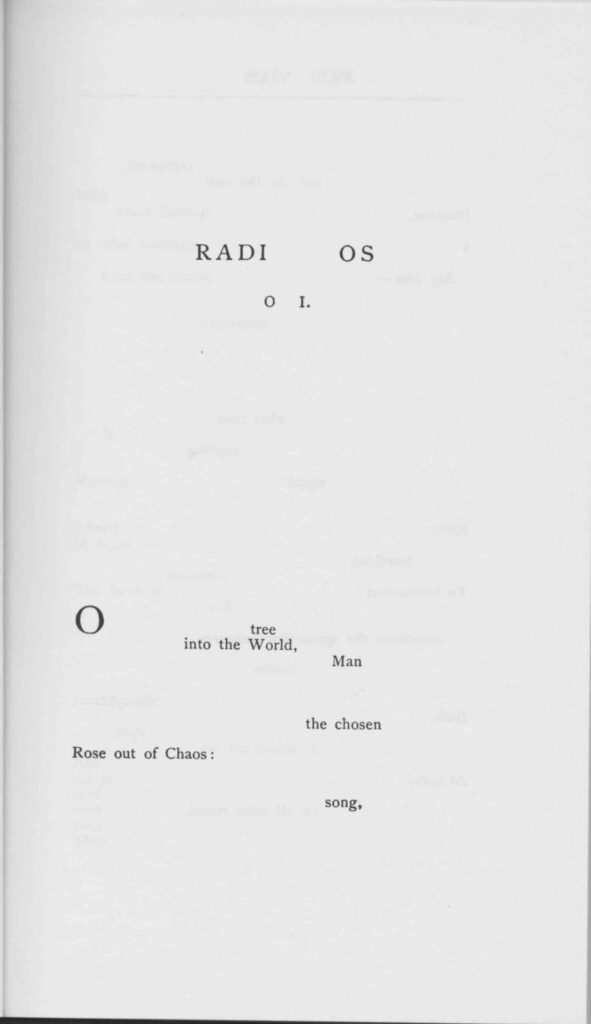
Image courtesy of the Ronald Johnson Collection, Kenneth Spencer Research Library, University of Kansas. Used with permission of the Literary Estate of Ronald Johnson.
Nobody wrote Radi Os. The poem was wondrously erased into existence. Its author’s words are nowhere to be found in this work, and yet—like Milton’s Creator—he’s everywhere.
“There is another world,” the French poet Paul Éluard once said, “but it is inside this one.” I think Johnson would gently amend this to say there are other worlds, but they are inside this one. Turning the astronomical theater of Paradise Lost inside out, Johnson investigates the plurality of worlds within: “worlds, / That both in him and all things, / drive / deepest.” A little textual puzzle from ARK, the cosmological epic Johnson labored over for twenty years, illustrates the wondrous multiplication of inner worlds throughout this poet’s work:
earthearthearth
earthearthearth
earthearthearth
The literary critic Stephanie Burt has deciphered the secret messages embedded in this triple-decker concrete poem. Earth, earth, earth. Ear, the art hearth. Hear the art, hear the art. Sampling a jeremiad from the King James Bible—“O earth, earth, earth, hear the word of the Lord”—Johnson composes a manifold matrix of worlds (and hearts). It’s one thing to register the verse in universe and another entirely to construct a poetics of the multiverse. The erasurist’s decision not to delete the s that pluralizes his book’s title makes worlds of this difference. Radi Os isn’t a radio; it’s an orchestra of radios. Well, that’s not quite right. See that caesura fracturing the poem’s title? An imaginary number of broken “radi os” hums and buzzes inside this literary hyperobject. One radio may tune into a single frequency at a time, but a chorus of broken radios can broadcast everything from an infernal racket to the music of the spheres all at once. “You don’t tamper with Milton to be funny,” our holy fool may attest, but for all its radical theology, Radi Os is, in the end, a divine musical comedy.
Listen carefully, and you’ll hear a marvelously cracked piece of postmodern music playing behind the curtain of Johnson’s literary erasure. At a party with his students one night—so the story goes—the poet first heard a recording of Baroque Variations, by the composer Lukas Foss. At one point in the work, a xylophone spells out Johann Sebastian Bach in Morse code. Elsewhere, a highly trained musician smashes a bottle with a hammer. Johnson’s various enthusiasms must have lined up nicely that evening, because he embarked upon the “solitary quest in the cloud chamber” that would become Radi Os the very next day. In the dedicatory note to his book, Johnson quotes Foss’s liner notes for Variation I—on a larghetto by Handel—as a sort of key to his own work:
Groups of instruments play the Larghetto but keep submerging into inaudibility (rather than pausing). Handel’s notes are always present but often inaudible. The inaudible moments leave holes in Handel’s music (I composed the holes). The perforated Handel is played by different groups of the orchestra in three different keys at one point, in four different speeds at another.
Handel’s larghetto, from the Concerto Grosso, op. 6, no. 12, may very well be the most beautiful melody the composer ever wrote. It’s easy enough to find online, if you’d like to hear the “always present but often inaudible” original music behind Foss’s détourned Variation I sometime. Then listen to the Foss, and you’ll experience the otherworldly beauty of Handel under eclipse. It’s hard not to hear broken radios searching for a classical music broadcast in this perforated larghetto’s eerie harmonics and bursts of sonority. If you find Radi Os slow going, try reading it as the libretto for a post-structuralist space opera—lyrics erased by Johnson, score perforated by Foss.
The wonder of variations—in music, in poetry, in evolutionary biology, and elsewhere—is how one variation begets another, though you never know what you’ll beget. Perforating Paradise Lost, Johnson produced a literary variation on Foss’s musical variation on a Baroque artist who composed dozens of variations of his own—including Hephaestus’s favorite, “The Harmonious Blacksmith.” To see how Radi Os makes possible even further variations on itself, let’s look at the original passage in the 1892 edition of Paradise Lost on the page where Satan’s shield first appears.
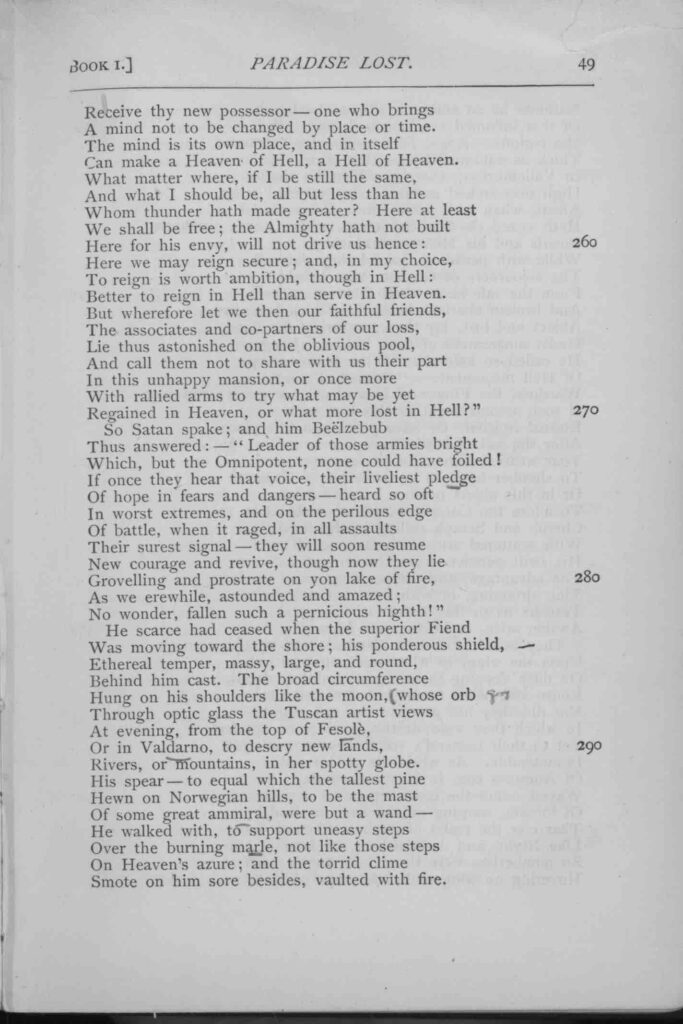
Image courtesy of the Ronald Johnson Collection, Kenneth Spencer Research Library, University of Kansas. Used with permission of the Literary Estate of Ronald Johnson.
What if somebody other than Johnson—say, a young woman in rural New England on a snowy night long ago—were to compose her own holes in this dark material?
time
Can
thunder
Here
Here in my
unhappy mansion
but
that voice
Of
fire
scarce ceased
the
Ethereal
artist
in her globe
Of
marle steps
On and
on
It’s hardly “Because I could not stop for Death,” but you get the idea. There are innumerable poems encrypted in the “harmonious numbers” of Paradise Lost. I even hear echoes of the sadly underrated poet, Star Trek aficionado, and Ronald Johnson enthusiast Srikanth Reddy in this literary cloud chamber.
The mind is
a
matter
my
friends
of
voice
the edge
Of it
moving
like
glass
in
Rivers
but
burning
I could do this forever, and that’s exactly the point. You could, too. I suspect that’s why Johnson breaks off his own work at Book 4 of Paradise Lost, leaving nearly seven thousand lines of pristine Miltonic pentameters for others to cross out someday. “Radi Os kind of wrote itself,” said the author of this unfinished erasure. “I think it ended when it needed to end, and I didn’t need to add the rest.” An open-ended variation on Milton’s song, Radi Os invites us to “add the rest.” And why stop at Paradise Lost, for that matter? Compose your own holes in any book—Alice’s Adventures in Wonderland, the Constitution of the United States of America, The Unsignificant—and you’ll unearth a manifold matrix of worlds within.
A literary multiverse, Radi Os is riddled with cosmological wormholes, theological rabbit holes, and typographical holes. From the “O tree,” a slant rhyme for poetry that opens the work, to the “O for / The Apocalypse” that trumpets the poem’s closing revelations, Johnson makes us see the hole in whole and hear the hole in holy. There’s a hole in wonder, too, though I’d never tumbled through it until I came across the following page in Radi Os:
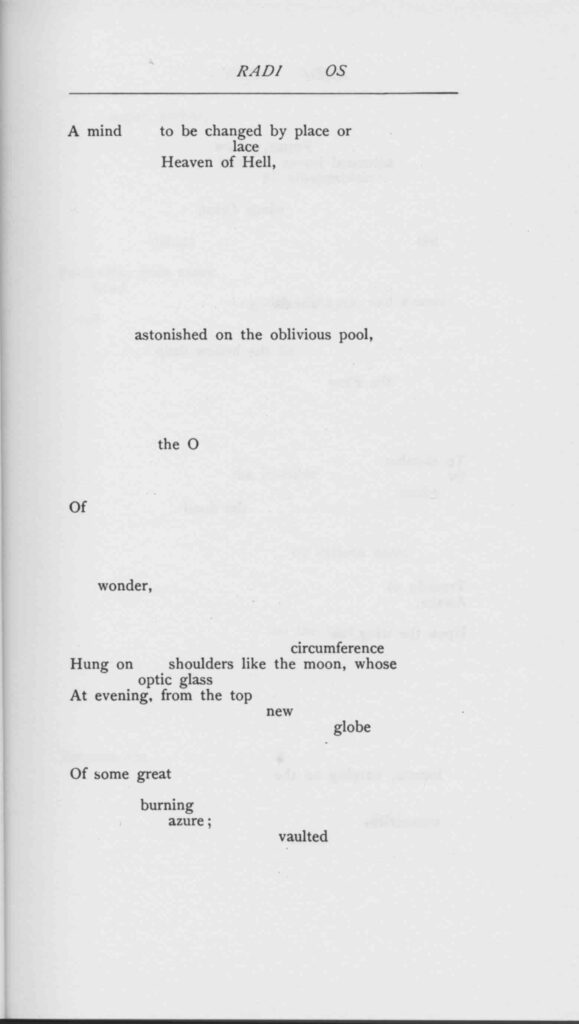
Image courtesy of the Ronald Johnson Collection, Kenneth Spencer Research Library, University of Kansas. Used with permission of the Literary Estate of Ronald Johnson.
The first time I read this passage, I had no idea what lay behind it. But that floating little phrase—“the O / Of / wonder”—kept looping around in my head, so I dug up an old copy of Paradise Lost to read the Miltonic original and was wonderstruck. Almost three thousand years ago, a blind Greek poet pictured the world on an ancient shield. Two and a half millennia later, the moon spied through an optic glass eclipsed Homer’s world in a theological poem of Reformation England. In my own lifetime—I was four, astronauts had set foot on the moon’s surface only a few years earlier—a little-known American poet erased Milton’s spotty globe all the way down to a wondrous O. World, moon, O. The word for when things line up in this way is syzygy. The microscopic linkage of chromosomes necessary for reproduction in our species is one example. An eclipse—when three celestial bodies line up in astronomical space—is another. The word syzygy is itself a syzygy, which almost makes me believe in intelligent design as far as language is concerned. Read aloud its sequence of three identical vowels lined up in a row—y, y, y—and you’ll hear humankind grappling with the mystery of causation. Let’s not overlook that linked chain of o’s in “the O / Of / wonder,” either. It’s a syzygy, too. Why, why, why? Oh, oh, oh. We all live that song.
So many images flicker through this O in Radi Os—a full moon, a ghostly shield, a hole in a page from a timeworn edition of Paradise Lost—but I always return to a mouth open in wonder. When we see golden acrobats turning handsprings on an ancient shield, or when the mountains of the moon first swim into focus through a telescope’s eyepiece, we say “O,” hardly aware that our lips are assuming the shape of the signifier itself. The “O” of wonder, Johnson shows us, is the o in wonder. I can’t think of any other word where our writing system and the morphology of human speech enter into such wondrous alignment. But the mouth forms an O in arousal, and in hunger, and in death’s terminal rictus, too: “Thy mouth was open,” George Herbert says to Death personified, “but thou couldst not sing.” There’s no such thing as pure or simple wonder. When thaumazein forces our lips into an O, all those ancient drives—from Eros to Thanatos—move through us as well. The art of poetry traditionally originates in this inexhaustible, sonorous “O.” O muse, O Lord, O my love, O late capitalism, O etcetera—the O that Johnson plucks out of wonder invokes endless poetic variation. With all due respect to Plato and Aristotle, philosophy isn’t the only vocation that springs from thaumazein. If you look closely at the O of wonder, you’ll see a poem beginning there, too.
Srikanth Reddy is the poetry editor at The Paris Review. This lecture will be published in Reddy’s The Unsignificant: Three Talks on Poetry and Pictures, forthcoming from Wave Books in September.
from The Paris Review https://ift.tt/LxA8nWz
Comments
Post a Comment